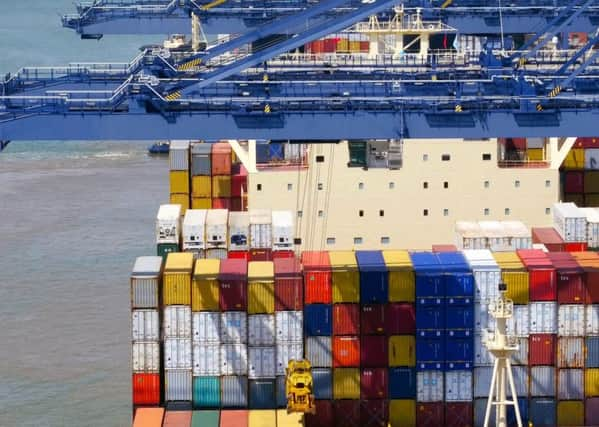Brexit: ‘Economic madness’ warning from NI businesses on GB customs plan


One local business owner described the requirement under Boris Johnson’s Brexit deal for export declarations on goods travelling across the Irish Sea as “economic madness”.
The Federation of Small Businesses (FSB NI), who last week gave a “cautious welcome” to news that the government had reached an agreement with the EU, are now warning of “significant concern” over details which have started to emerge.
Advertisement
Hide AdAdvertisement
Hide AdBrexit Secretary Steve Barclay confirmed at the House of Lords on Monday that Northern Ireland businesses will be expected to make an ‘export declaration’ when their goods are shipped to other parts of the UK under the terms of the deal.
Several Northern Ireland industry bodies have warned of negative consequences for business.
Northern Ireland Chamber of Commerce and Industry (NI Chamber) chief Ann McGregor said: “Whatever these forms turn out to be, it will be very different from what we have now – adding a further administrative burden to businesses and slowing down the on-time delivery model that many companies operate.”
Retail NI chief Glyn Roberts expressed similar concerns about the potential impact on the supply chain relied upon by local retailers.
Advertisement
Hide AdAdvertisement
Hide Ad“Our aim is that we should have frictionless trade not just north-south but west-east as well. There should not be any burdens on business and perhaps more importantly, there should not be any burdens on the supply chain. Obviusly we do operate on this just-in-time supply chain basis. That just-in-time supply chain between GB and Northern Ireland is hugely important. It is important that that is as frictionless as possible.”
The News Letter also spoke to Wesley Johnston, who operates a Northern Ireland publishing business, on the practical implications of the requirement for ‘export declarations’.
“Our Newtownards-based publishing business relies on distributors in both Dublin and England for a major percentage of our income,” he explained. “Amazon operates on a just-in-time basis and we need to send books rapidly to their English distribution centres with minimal notice.
“Similarly, we depend on large distribution companies based in England to get our books out to shops and schools. If we have to fill out customs paperwork every time we send stock over the Irish Sea, it will be a huge administrative and financial burden, and risks disrupting the critical time flows we depend on.”
Advertisement
Hide AdAdvertisement
Hide AdHe continued: “Additionally, we print some of our books in both England and the EU and if these supply chains are disrupted, it will again come at a cost.
“We strongly support avoiding a hard border in Ireland, but creating one in the Irish Sea seems like economic madness.”
“Even the Brexit minister seems unsure of his facts – there are just two weeks to go and we still don’t know all that we will need to do.”
Mr Roberts also called for greater clarity.
“We have had three versions of a withdrawal deal now. A very clear economic impact assessment would give us a very clear view. That’s what we need right now and we haven’t had that clarity yet.”
Advertisement
Hide AdAdvertisement
Hide AdMs McGregor said: “The new deal includes a de facto customs border in the Irish Sea, bringing with it the concept of export summary declarations.
“It is still unclear what exactly these will look like, they will be discussed and agreed by the joint committee during the transition period should the prime minister’s deal pass.”
FSB NI policy chair, Tina McKenzie, said: “Details which have begun to emerge from the Brexit secretary and an HMRC impact assessment do cause significant concern regarding the additional costs faced by small businesses when trading between Great Britain and Northern Ireland.”
She added: “While ensuring that cross-border trade on the island of Ireland remains frictionless, it is also essential that trade with Great Britain remains unfettered.”